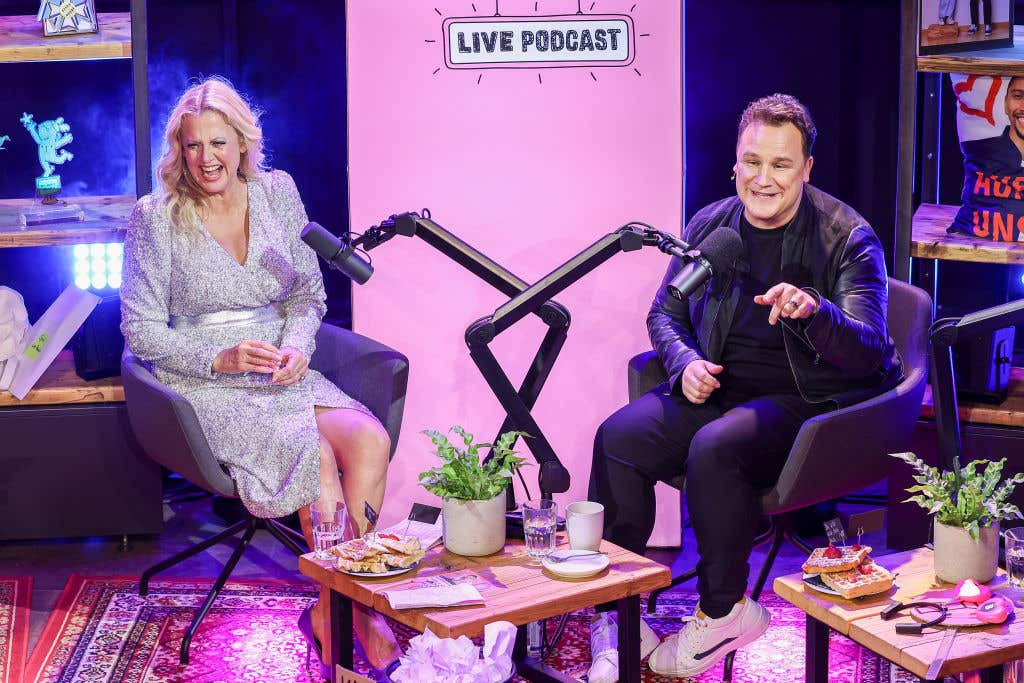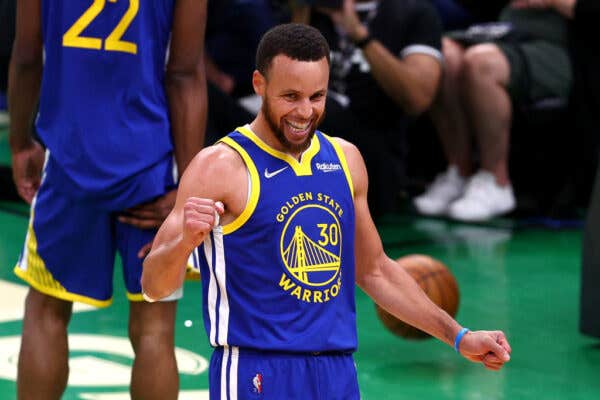
(L) Barbara Schöneberger and Guido Maria Kretschmer during the live podcast “Mit den Waffeln einer Frau” at Mojo Club on April 17, 2023 in Hamburg, Germany. (Photo by Gerald Matzka/Getty Images)
Gerald Matzka/Getty ImagesOn a brisk but pleasant Friday evening, I'm walking around Boston's Fenway Park to get to a concert at the House of Blues. Though the Red Sox season was long over, I was greeted with enthusiastic crowds and lines wrapped all the way up Lansdowne Street. They were eagerly awaiting to enter the MGM Music Hall across the street to see Alex Cooper's Call Her Daddy Podcast show live, on its opening night of the tour.
Five days later, I hear from a close friend that they too had just gone to see their favorite podcast live at the Beacon Theatre in New York City. My friend is a faithful follower of this podcast, and had planned the adventure into the city for weeks. I'm talking, new on-brand outfits that were only to be worn to this show, dinner reservations, and thumbs that had been extra stretched to be ready to post Instagram stories at any time. There was just one problem. She did not enjoy the podcast show. "It just didn't translate as it normally does through its streaming channel," she said.
So What Makes A Podcast Work As a Live Show?
Dax Shepard and his Armchair Expert show got much of it right back in 2019. As did Smartless. It's certainly not as easy as it seems. As opposed to sitting in a recording room with two strong microphones with editing abilities, you are live. Furthermore, you are essentially trying to do more with less. Meaning, your live show has to resonate with the audience in the theatre first. For a podcast on tour, that immediate audience is actually smaller than the one that typically streams. Yes, many of the live podcast shows also post it to their appropriate channels, but in order for it to connect, you have to capture the magic in the room.
In my experience, here are the essentials.
Keep It Concise
The last time you went to MGM Music Hall you were most likely there for well over two hours seeing live music. A podcast show doesn't need an opener. Start at 8 or 9pm and get right to it. Then, do the show as you normally would. Call Her Daddy and Smartless are both typically around an hour on average. So were their live podcasts. Where Armchair Expert succeeded is understanding you don't have to make an overblown show out of it. Shepard and his co-host Monica Padman made the audience feel that they were simply sitting with them in the attic where Armchair Expert is usually recorded.
Special Guests
This is the big unkept secret. Having a special guest (usually a celebrity) come out to join a portion of the live podcast. When it's unannounced, unexpected, and relevant to the city you are in, it always wins over the crowd.
The Host Is Hosting, Not Performing
Typically, the host of the podcast is sitting in a chair for much of the evening and talking. Have the self-awareness not to feel as if you need to deliver a stand-up comedy special. Be your normal hosting self. That's enough. When you push the limits because you feel the responsibility of the show being a paid ticketed event, you lose the character of why people listen in the first place. A podcast show host has a mysterious aura to them. They are streamed characters and personalities. Now in a theatre your audience gets the human element side of you. And that's all they need.
I left the House of Blues concert early that Friday. Coincidentally, right as Cooper's Call Her Daddy opening night concluded. She obviously kept it concise. The aforementioned Beacon Theatre show my friend went to, went on for well over two hours.
Bring It Home
As I got to my car, I noticed two people who had just come from the live podcast show were parked next to me. They were literally skipping to their car doors and raving about special surprise guest, Hannah Berner being there. This show clearly resonated.
The thing about a podcast is that each episode is unique. It's similar to a band that consistently changes their setlist so that each fan in attendance gets "their night." A live podcast show that has that same affect leaves a lasting impression. That's the podcast episode that you were part of it, as opposed to a show that you were there to watch. By comparison, its similar to that of attending a live Peloton class. You go to join the instructors ride, not to watch them crush their individual workout.
Some podcasts are destined for staying in their behind closed doors lanes. Those that simply open the doors to their home studio and let their faithful audience partake in the conversation, can take their show on the road. Just don't lose sight of the fact that it's a podcast, and that is okay.





